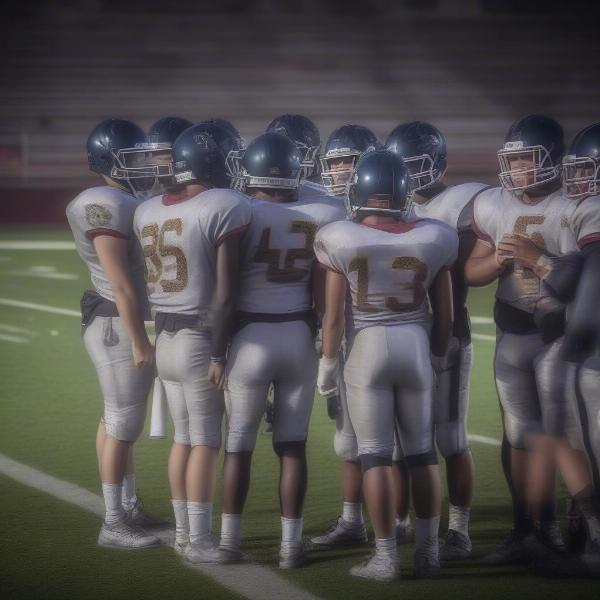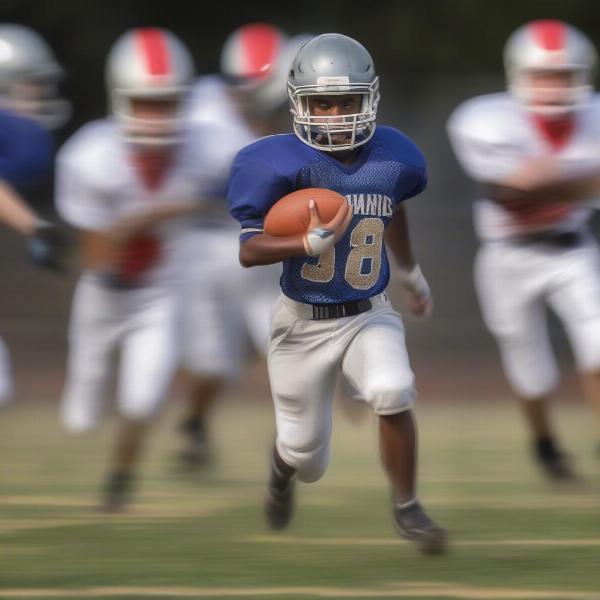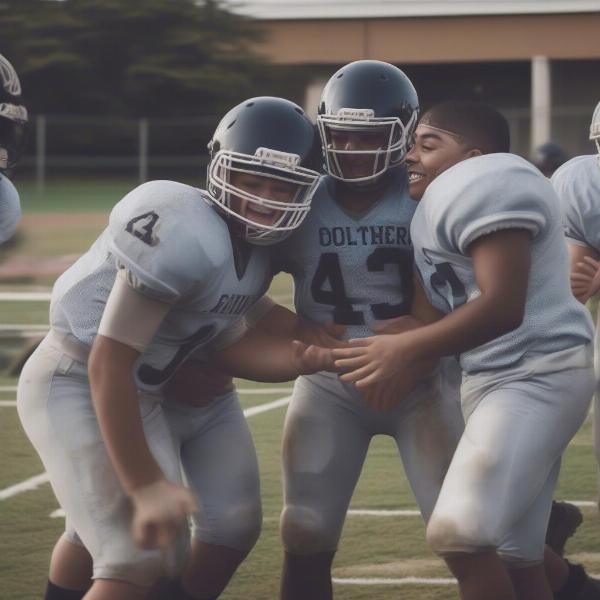Understanding how long a freshman football game lasts is crucial for players, families, and fans. The duration isn’t always as straightforward as a varsity game, and various factors can influence the final whistle. This article will delve into the typical length of these games, the rules impacting game time, and the reasons why they might differ from varsity-level matchups.
Decoding Freshman Football Game Lengths
Freshman football games typically run shorter than varsity games. While varsity games usually consist of four 12-minute quarters, freshman games often have 10-minute quarters, resulting in a total game time of approximately 40 minutes. However, this is just a general guideline. The actual length can vary depending on the specific league, state regulations, and agreements between the competing schools. Sometimes, especially with younger freshman teams, quarters might be even shorter, at 8 minutes each.
Rules and Regulations Affecting Game Time
Several rules and regulations can influence the duration of a freshman football game. Just like in varsity games, timeouts, penalties, and injuries can all stop the clock, leading to a longer overall game time. Halftime is typically shorter than varsity games, often around 10-15 minutes, contributing to the quicker pace of freshman games. Furthermore, some leagues implement a running clock in the second half if a significant point differential exists, aiming to prevent runaway scores and expedite the game. This running clock often stops only for timeouts or injuries.
The Impact of Running Clocks
Running clocks are a common feature in freshman football, especially if the score becomes lopsided. This practice ensures player safety and allows teams to move on to the next game without unnecessary delays. While it can shorten the overall game time significantly, it also provides coaches with the opportunity to give more players valuable game experience, a key element of development at the freshman level.
Timeouts and Their Strategic Use
Freshman teams, just like their varsity counterparts, have access to timeouts. These strategic pauses can be used to regroup, adjust game plans, or simply give players a breather. While the number of timeouts permitted varies by league, their strategic deployment can significantly impact the flow and, ultimately, the length of a game.
 Freshman Football Team Taking a Timeout
Freshman Football Team Taking a Timeout
Why Freshman Games Differ from Varsity
The shorter game times for freshman football are primarily designed to cater to the younger players’ developmental needs. Shorter quarters help manage fatigue and minimize the risk of injury. These games are fundamentally about learning the game, developing skills, and building a foundation for future success at higher levels. The emphasis is on participation, skill development, and sportsmanship, rather than the intense competition often seen in varsity games.
Focusing on Player Development
Freshman football is a crucial step in a player’s journey. These games provide a platform for players to hone their skills, learn teamwork, and adapt to the physical demands of the sport. The shorter game format helps ensure that this learning process is optimized for their physical and mental development.
Building a Foundation for the Future
The freshman year is all about laying the groundwork for future success. By learning the fundamentals and experiencing game situations, these young athletes build a foundation that will serve them well as they progress through their high school football careers.
 Freshman Football Player Running With the Ball
Freshman Football Player Running With the Ball
FAQs about Freshman Football Game Lengths
Here are some frequently asked questions about the duration of freshman football games:
-
What is the typical length of a freshman football game? Generally, freshman football games last about 40 minutes, with four 10-minute quarters. However, this can vary based on league rules and agreements between schools.
-
Are there running clocks in freshman football? Yes, many leagues implement running clocks, particularly in the second half, if a team achieves a substantial lead.
-
How long is halftime in a freshman football game? Halftime in freshman games is generally shorter than varsity games, usually around 10-15 minutes.
-
Do freshman football games follow the same rules as varsity games? While many rules are the same, there can be variations specific to freshman leagues, often designed to emphasize player safety and development.
-
Why are freshman games shorter than varsity games? Shorter games are intended to address the physical and developmental needs of younger players, reducing fatigue and injury risk.
-
Can the length of a freshman game change? Yes, the game length can be adjusted due to unforeseen circumstances, such as weather delays or injuries, although this is less common.
-
Where can I find specific rules for my local freshman league? Check with your school’s athletic department or the league’s governing body for the most accurate and up-to-date information.
Beyond the Clock: The Value of Freshman Football
While knowing How Long Are Freshman Football Games is important for scheduling and planning, the real value lies in the experience gained by these young athletes. These games are a crucial stepping stone in their football journey, fostering development, teamwork, and a passion for the sport.
 Freshman Football Team Celebrating Victory
Freshman Football Team Celebrating Victory
Conclusion
Understanding the typical length of a freshman football game, and the factors that can influence it, allows players, families, and fans to be better prepared and appreciate the unique aspects of this developmental level of the sport. While these games might be shorter than varsity matchups, their importance in a young player’s growth and future in football is immense. Remember to check with your local league for specific rules and regulations regarding game times.

